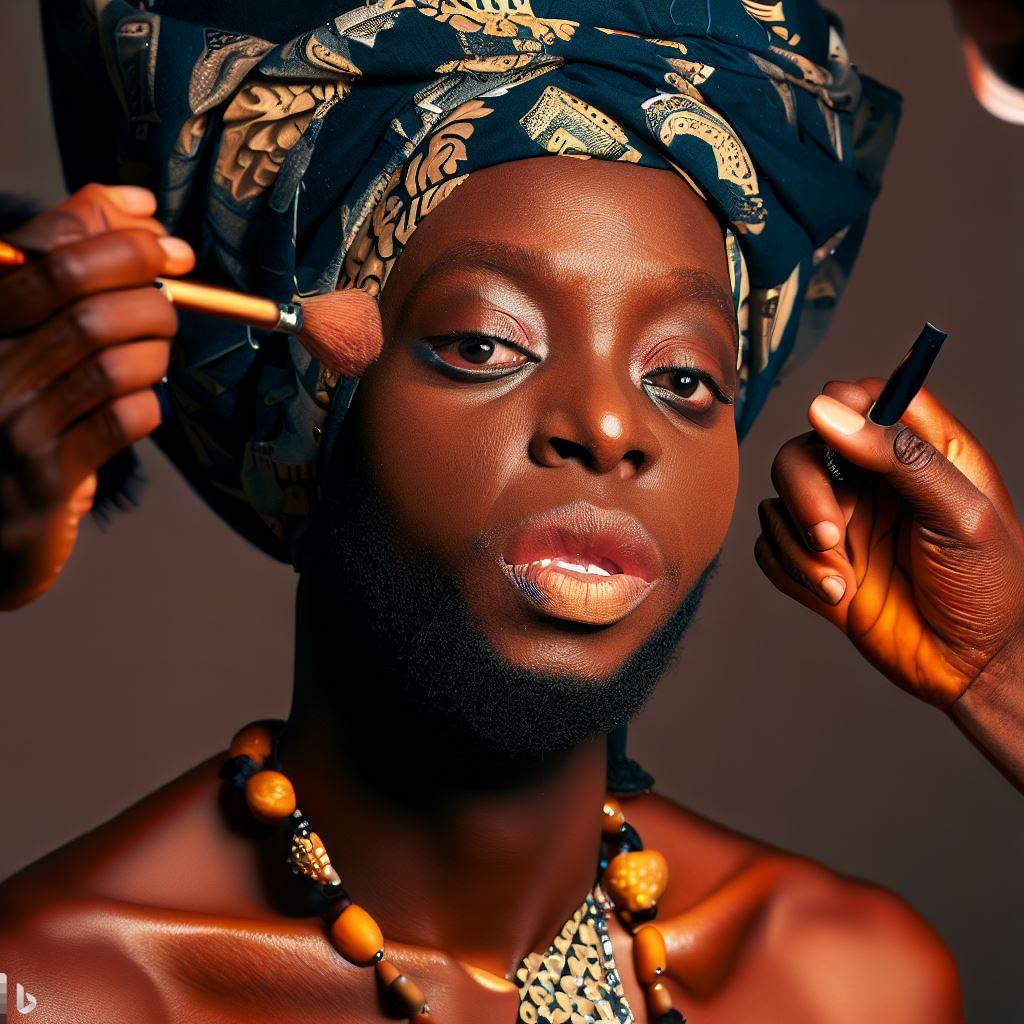Introduction
In this blog post, we will focus on exploring the various Foley Artist Opportunities in the Music Industry of Nigeria.
Foley art, an integral part of the music industry, involves creating and adding sound effects to enhance audio-visual content.
Explanation of Foley Art and Its Importance
Foley art involves creating sound effects to enhance audiovisual content, adding realism and emotional depth.
Focus of the Blog Post
This chapter delves into the world of foley artists, shedding light on the opportunities within Nigeria’s music industry.
- Creating Immersion: Foley artists infuse authenticity, immersing listeners in a sensory-rich musical experience.
- Emotional Impact: Precise sound effects evoke emotions, deepening the connection between music and its audience.
- Artistic Expression: Foley artists contribute artistic flair, crafting sonic textures that complement musical narratives.
- Industry Expansion: As music diversifies, foley artistry finds new avenues to enhance storytelling and engagement.
Exploring Foley Artist Opportunities in Nigeria’s Music Industry:
- Film Soundtracks: Collaborate with filmmakers to create original soundscapes that amplify movie impact.
- Album Production: Elevate music albums with tailor-made sound effects, creating captivating sonic journeys.
- Live Performances: Enhance concerts and shows with real-time sound elements, captivating the audience’s senses.
- Jingles and Commercials: Contribute to advertising by providing sound effects that align with brand messaging.
Nigeria’s music scene teems with possibilities for foley artists. Join the journey of sonic enchantment!
Current State of Nigeria’s Music Industry
Nigeria’s music industry has experienced significant growth in recent years, cementing its position as one of Africa’s leading contributors to the global music scene.
With a rich cultural heritage and a diverse range of genres, Nigerian artists have been able to captivate audiences both at home and abroad.
Overview of Nigeria’s Flourishing Music Industry
The music industry in Nigeria has witnessed exponential growth, fueled by factors such as technological advancements and a vibrant local music culture.
In recent years, there has been a surge in the number of musicians, producers, and industry professionals, creating a dynamic ecosystem.
The increasing accessibility of music tools, the digital platforms’ rise for distribution, and global Nigerian music demand fuel this growth.
The industry has also benefited from the rise of social media, allowing artists to connect directly with their fans and build a strong following.
Impact on the Global Music Scene
Nigeria’s music industry reshaped global music, defying norms, crafting a unique African sound, and captivating diverse worldwide audiences.
Nigerian artists such as Wizkid, Burna Boy, and Davido have achieved international acclaim, collaborating with renowned musicians and winning prestigious awards.
These collaborations and recognition have opened doors for Nigerian artists, allowing them to reach new markets and expand their fanbase.
The global success of Nigerian music has also sparked interest in the broader African music industry, leading to collaborations between Nigerian and other African artists.
Diverse Genres and Artists Contributing to Nigeria’s Music Industry
Nigeria’s music industry is a melting pot of diverse genres and artists, each making a unique contribution to the country’s musical landscape.
The burgeoning Nigeria music industry is opening up exciting Foley artist opportunities for individuals with a passion for sound design and creativity.
Afrobeats merges African rhythms with pop. Afrofusion mixes Afrobeats with global influences. The industry presents an array of sounds.
Afrobeats, in particular, has gained significant popularity both within and outside Nigeria, with artists like Tiwa Savage, Yemi Alade, and Mr Eazi taking the genre to new heights.
These artists have successfully blended local sounds with international elements, making Nigerian music appealing to a global audience.
Other genres such as Highlife, Juju, and Afrojuju also play significant roles in Nigeria’s music industry, showcasing the country’s cultural heritage.
Artists such as King Sunny Ade and Sir Shina Peters have achieved legendary status within these genres, paving the way for younger artists to explore and innovate.
In the end, Nigeria’s music industry is thriving, with artists making significant strides both locally and internationally.
The industry’s growth has been fueled by technological advancements, a vibrant music culture, and a diverse range of genres.
As Nigeria’s music industry continues to evolve, it will undoubtedly shape the future of African music and further establish the country as a global powerhouse in the music scene.
Read: Celebrating Nigeria’s Foley Artists: Unsung Heroes of Sound
Understanding foley art
As the Nigeria music scene continues to flourish, there is a growing demand for skilled Foley artists to enhance the auditory experience of songs and compositions.
This creates Foley Artist Opportunities in Nigeria Music Industry
Foley art and its role in enhancing music production
- Foley art is the practice of creating and adding sound effects to enhance music production.
- Artists use various objects and techniques to replicate sounds that synchronize with visual cues.
- The process involves watching the video footage and carefully matching sounds to the actions on screen.
- Foley artists use props like shoes, clothes, and household items to create specific sounds.
- They manipulate these objects to imitate footsteps, clothing rustling, and other natural sounds.
- Foley art goes beyond just recording sounds; it is about capturing the essence and emotion of a scene.
Creating foley sound effects
- To create foley sound effects, artists break down a scene and identify the sounds needed.
- They collect a range of props, objects, and surfaces that can produce the desired sounds.
- The artists perform different actions, such as walking, opening doors, or handling objects, while recording.
- They pay close attention to the timing and intensity of the actions to create realistic sound effects.
- After recording, the foley sounds are edited and synchronized with the visual elements of the scene.
- This meticulous process ensures that the sound effects seamlessly integrate with the music and dialogue.
The importance of foley art for sound experiences
- Foley art enhances the realism of a film or music production, making the experience more immersive.
- It bridges the gap between what is seen and heard, creating a cohesive and believable audiovisual experience.
- Foley art helps to convey emotions and add depth to storytelling through subtle sound cues.
- It allows viewers and listeners to feel more connected to the characters and the on-screen events.
- Without foley art, the sound of footsteps, doors, or even a gentle breeze would be missing.
- These details create a realistic environment and contribute to a more captivating overall experience.
- Music producers and filmmakers rely on foley art to bring their creations to life and engage the audience.
In fact, foley art plays a crucial role in enhancing music production by adding realistic sound effects. Foley artists use their creativity and attention to detail to replicate sounds that synchronize with visual cues.
The process involves collecting props, performing actions, and editing the recorded sounds to create an immersive audiovisual experience.
Foley art bridges the gap between what is seen and heard, making productions more believable and engaging.
Without foley art, the world of music and film would lack the depth and realism that captivate audiences.
Read: How to Become a Successful PR Specialist in Nigeria
Foley Artist Opportunities in Nigeria’s Music Industry
Nigeria’s music industry has experienced significant growth in recent years, resulting in an increased demand for foley artists.
Foley artist opportunities in the Nigeria music industry offer a unique chance to contribute to the sonic landscape of diverse genres and leave a lasting impact on listeners.
Foley artists play a vital role in creating realistic sound effects for music productions, and their contribution is now being recognized and sought after.
This section examines Nigeria’s music industry’s rising need for foley artists, their varied opportunities, and collaborations with producers/artists.
Increasing Demand for Foley Artist Opportunities in in the Music Industry of Nigeria
The Nigerian music industry has witnessed tremendous growth and international recognition, leading to a greater emphasis on high-quality music production.
Sound effects are crucial in creating immersive listening experiences, and foley artists are the experts who bring these effects to life.
As a result, there is a rising demand for skilled foley artists to meet the industry’s needs. Foley artists use various techniques and objects to create sound effects that enhance the overall music production.
They meticulously record and recreate sounds such as footsteps, door creaks, raindrops, and any other required sounds that add depth and realism to the music.
This attention to detail is now highly valued by music producers and artists in Nigeria.
Range of Foley Artist Opportunities in the Music Industry of Nigeria
The increasing demand for foley artists in Nigeria’s music industry has opened up a wide range of opportunities for aspiring professionals in this field.
Foley artists can find work in recording studios, where they collaborate with music producers and artists to create custom sound effects for specific tracks.
They may also be involved in live performances, where they work alongside musicians to recreate sound effects during concerts or other events.
Foley artists can also find opportunities in the film industry, as many Nigerian movies rely on realistic sound effects to enhance the viewing experience.
Additionally, foley artists have the chance to work on various genres of music, ranging from Afrobeats and hip-hop to traditional Nigerian music styles.
The versatility of these artists allows them to adapt their skills to different musical contexts, broadening their opportunities within the industry.
Collaboration between Foley Artists and Music Producers/Artists
The collaboration between foley artists and music producers/artists is a vital aspect of the creative process in Nigeria’s music industry.
Foley artists work closely with producers and musicians to understand the desired sound effects and bring them to life.
Music producers and artists rely on foley artists to add unique and authentic sound effects that enhance the storytelling within their music.
This collaboration ensures that the final product is not only artistically pleasing but also engaging for the listeners.
Foley artists enhance scenes with active atmospheric sounds: bustling Lagos streets, wildlife noises, and the ambiance in Nigerian markets.
The collaborative nature of this work allows for experimentation and innovation, resulting in a more dynamic music production.
Foley artists’ demand surges in Nigeria’s music sector, creating ample careers for those keen on this field.
Foley artists and music creators collaborate, crafting immersive sound. They enhance experiences with lifelike effects for listeners.
As the Nigerian music industry continues to expand and gain recognition on a global scale, the role of foley artists will become increasingly important.
Embracing foley artistry, Nigeria’s music can thrive, crafting captivating, high-quality music appreciated globally.
Read: Nigeria’s Animation Industry: Past, Present, Future

Challenges and obstacles for foley artists in Nigeria
Lack of recognition and support for Foley Artist Opportunities in the Music Industry of Nigeria
Foley artists in Nigeria face significant challenges and obstacles in their pursuit of success in the music industry.
Foley artists’ importance grows as both emerging and established musicians embrace their role, creating more Nigerian music industry chances.
One of the primary issues they encounter is the lack of recognition and support for their craft.
Foley artists, working behind the scenes, contribute unnoticed unlike acclaimed musicians and producers who receive widespread attention.
As a result of this lack of recognition, foley artists struggle to gain access to opportunities that could help them showcase their skills and talents.
They find themselves overlooked and underappreciated in comparison to other key players in the music industry.
This dearth of recognition severely hampers their ability to establish themselves and build a successful career in Nigeria.
Limited resources and infrastructure for Foley Artist Opportunities in the Music Industry of Nigeria
Another significant challenge faced by foley artists in Nigeria is the limited availability of resources and infrastructure necessary for their work.
Foley art requires specialized equipment and tools, such as sound libraries, props, and recording studios. However, in Nigeria, these resources are often scarce and not easily accessible to aspiring foley artists.
Without proper access to resources, foley artists struggle to produce high-quality sound effects that can enhance the overall listening experience.
They are forced to work with subpar tools, compromising the quality of their work and hindering their ability to compete with international standards.
The lack of adequate infrastructure thus acts as a barrier to the growth and development of foley art in Nigeria.
The need for education and training programs for Foley Artist Opportunities in the Music Industry of Nigeria
There is a pressing need for education and training programs specifically designed for aspiring foley artists in Nigeria.
While there are some educational institutions that offer music production courses, these programs seldom focus on the intricacies and techniques of foley art.
Aspiring foley artists in Nigeria often find themselves without access to proper guidance and training, leaving them to navigate the complexities of their craft alone.
Without adequate training, it becomes difficult for them to refine their skills and understand the intricacies of creating realistic sound effects that perfectly complement the music being produced.
To address these challenges, it is crucial for the Nigerian music industry to recognize the significance of foley art and provide the necessary support.
Acknowledging the contributions of foley artists and incorporating their work into mainstream music production can foster a more inclusive and enriched creative environment.
Moreover, investing in the development of infrastructure and resources for foley art will enable aspiring artists to access better tools and equipment, resulting in higher quality sound effects.
This, in turn, will enhance the overall music production in Nigeria and allow foley artists to showcase their talents to a wider audience.
These programs should focus on teaching the techniques, theories, and practical applications of foley art, enabling aspiring artists to refine their skills and contribute meaningfully to the music industry.
In a nutshell, foley artists in Nigeria face a multitude of challenges and obstacles.
The lack of recognition, limited resources, and the absence of specialized training programs hinder their ability to succeed in the music industry.
By addressing these issues and taking proactive steps towards supporting and empowering foley artists, Nigeria can bridge the gap and unlock the full potential of this unique art form.
Read: The Role of Public Relations Specialists in Nigeria Today
Gain More Insights: The Impact of Management on Nigeria’s Performers’ Success
Publish Your Professional Profile, Business or Brand
Showcase your expertise, gain trust, and boost visibility instantly on Professions.ng.
Publish NowSuccess stories and achievements
Success Stories of Foley Artist Opportunities in the Music Industry of Nigeria
Oscar-winning foley artist, Tunde Babalola, made waves in the industry with his groundbreaking sound designs.
From recreating natural sounds to crafting imaginative auditory elements, Foley artist opportunities in the Nigeria music industry have the chance to collaborate with top talents and shape the industry’s sonic direction.
Babalola’s work on the film “The Power of Sound” earned him critical acclaim and international recognition. His contribution to the film industry in Nigeria opened doors for other foley artists to showcase their talents.
Sophia Okon, another Nigerian foley artist, gained prominence for her exceptional work on blockbuster movies.
Okon’s attention to detail and ability to create realistic sounds using everyday objects impressed both audiences and filmmakers.
Her contribution to the success of Nigerian films showcased the significance of foley art in the industry.
Chuka Ike, a rising star in the field, is known for his unique approach to foley art. Ike’s experimental sound designs have garnered him numerous awards and recognition.
His dedication to pushing the boundaries of foley art has inspired a new generation of Nigerian artists.
These success stories highlight the achievements of Nigerian foley artists and their valuable contributions to the industry.
They prove that with talent, hard work, and determination, foley art can lead to tremendous success. Their accomplishments serve as a motivation for aspiring foley artists in Nigeria to pursue their dreams.
Furthermore, these success stories emphasize the potential for growth and recognition in the field of foley art in Nigeria.
The achievements of Babalola, Okon, and Ike demonstrate that there is a demand for skilled foley artists. With the rapid expansion of the music industry in Nigeria, opportunities for foley artists are increasing.
More films, TV shows, and music videos are being produced, creating a need for high-quality sound effects. As technology continues to advance, the role of foley artists becomes even more significant.
Their contributions and achievements
Nigerian foley artists have the chance to contribute to the immersive experience of audiences through their creative sound designs.
By utilizing various objects and techniques, foley artists can bring scenes to life and enhance storytelling. Additionally, the recognition and support given to foley artists in Nigeria are growing.
Film festivals and awards ceremonies now have categories dedicated to sound design and foley art. This acknowledgment further validates the importance of foley art in the industry.
With increased recognition, there are more opportunities for foley artists to collaborate with renowned filmmakers and musicians.
These collaborations can open doors to international projects and exposure for Nigerian foley artists.
Basically, Nigerian foley artists have demonstrated their talent and made significant achievements in the industry.
Their success stories highlight the potential for growth, recognition, and opportunities in the field of foley art in Nigeria.
As the music industry continues to evolve, the demand for skilled foley artists will only increase.
It is an exciting time for aspiring foley artists in Nigeria, as they have the chance to make their mark and contribute to the creative landscape of the country.
Conclusion
The importance of foley art in the music industry cannot be overstated. It adds depth and realism to music productions, creating a more immersive experience for the listeners.
Nigeria’s music industry, with its rapid growth and diversity, offers a vast potential for foley artist opportunities. As the industry continues to expand, the demand for skilled foley artists will only increase.
For aspiring foley artists, Nigeria is a promising space to explore and pursue their passion. With the right training and dedication, they can carve out successful careers in this vibrant music industry.
So, to all those who have a love for foley art, don’t hesitate to dive into Nigeria’s music scene. Embrace the opportunities, hone your skills, and be a part of the creative force driving the industry forward.
The possibilities are endless, and your talent can truly make a difference.




